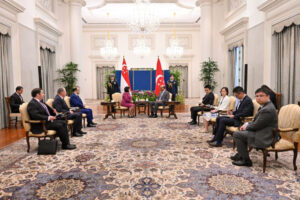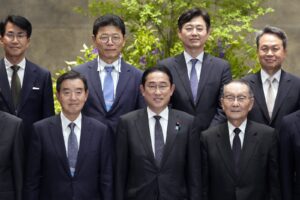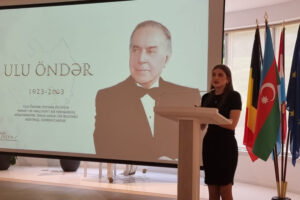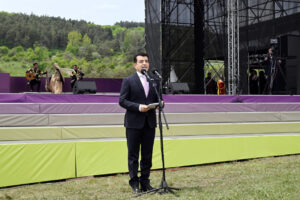Tokyo, 07 March, /AJMEDIA/
NISEKO – The Hokkaido mountain resort town of Niseko draws winter sports lovers from all over the world, but underneath this youthful and dynamic image is a male-dominated local assembly that has seen accusations of harassment targeting its lone female member.
Third-term councilor Umeko Saito, 75, says she has been targeted on numerous occasions, including being inappropriately touched by a councilman and being intimidated by colleagues who refused to countenance her right to pose questions.
Despite this, she has remained steadfast in her mission to represent the town of approximately 5,000 residents in Japan’s northernmost prefecture, holding firm in her belief that “women’s perspectives are indispensable in politics. Everyday life and politics are interconnected.”
When speaking to Saito in an interview about her experiences in Niseko, what became clear is how bizarre the local “boys club” political scene is. Niseko, an area known worldwide for its deep powder snow and bustling ski resorts, has a growing population of foreign residents but is represented by a group of Japanese men who remain wedded to the past.
Saito, who hails from the prefectural capital of Sapporo, spent time in the United States, Britain and Kobe, Hyogo Prefecture, before moving to Niseko in 2006. The town had had an all-male “zero female council” from 2007 until Saito’s election in 2011.
Saito, who had been president of a neighborhood association for a 3,000-resident housing complex in Kobe, had many experiences negotiating with municipal authorities and believes in the importance of having women playing central decision-making roles.
“I thought it was strange to have a council with no women even though half of Niseko’s population is female. I saw running for office as my mission,” said Saito, who was elected as the sole female on the 10-person Niseko town council on her first try.
After being elected, Saito’s first surprise came when she learned about the council’s custom of inviting paid “hostesses” to attend year-end and other parties. When she asked a fellow council member if hiring the women is appropriate, he answered, “It’s comforting to have them there.”
Although no public funds were used, Saito continued to express her belief that such practices are wholly unsuitable and got the councilors to stop. However, when she asked female councilors in nearby municipalities what they thought of the situation, she received an unexpected response.
If there are no hostesses, one female councilor told her, “I would have to assume the role of serving drinks (to male participants) myself.”
During her time as a rookie councilor, Saito was once touched inappropriately by a councilman at a banquet. She knocked his hand away and protested, but her displeasure only grew.
She recalls the ageist and sexist innuendos aimed at her when she was ill and resting in the council’s waiting room, and being ridiculed about her marital relationship on the way home from a social function.
“I often think the council must be a half to a full century behind the times,” Saito said.
Often, Saito says male colleagues have interfered with her official activities. On one occasion they summoned her to a small room, surrounded her and pressed her to withdraw questions she had been planning for council sessions, she says.
The questions pertained to local transport issues and other matters that she had prepared by speaking directly with constituents and seeking advice from more experienced councilors in other areas. She was denied at every turn.
When Saito told her male colleagues, “I’m going to ask the question,” she was scolded. One back-and-forth exchange she had with the male councilors lasted more than two hours.
But the farcical and arrogant nature of the male councilors only became more apparent.
On one occasion, while Saito was asking a question, a male council member looked out the window and exclaimed loudly, “Oh! A rainbow! It’s beautiful!” She says that other council members joined in to talk about the “beautiful rainbow,” effectively silencing her.
If she even asked to clear up a point a local town official was explaining during a council session, her male counterparts would shout her down, telling her to be quiet and listen.
They refused to engage with her when she raised the issue of “period poverty,” which concerns women who struggle to pay for menstrual products due to their financial situation. Often the recipient of foul-mouthed jeers, Saito said she felt “like a foreign thing in a man’s world. From their point of view, I was something to be eliminated.”
More recently, Saito was featured in the town’s public relations magazine when it took up the topic of gender equality and carried her interview and photo as the only female member of the local council actively tackling the issue.
But a male councilor objected, complaining that “it is unfair to print a story about a specific councilor.” It caused such an uproar that the entire council was called for a meeting, and the mayor was summoned. In the end, an apology for lacking “fairness in the run-up to local elections” this April was published in the subsequent issue of the magazine.
When Kyodo News asked about this point, the town office said although it had finished Saito’s interview in the fall of last year, there was a delay in carrying the story in the magazine because of a shortage of staff, among other reasons.
As to whether there were similar instances of councilors being featured in the magazine, an official in charge admitted some stories had been done about male councilors who hold second jobs as farmers, firemen and the like.
As the experiences piled up, Saito began to worry that if she asked any more questions, she would be obstructed or contradicted. She became practically bedridden and even lost her voice for a time, and a psychiatrist diagnosed her with an adjustment disorder.
Amid this isolation and helplessness, she began to express herself through her blog. But even there, she received many aggressive comments. Although the posts were anonymous, she was wise to the men behind them.
Because Saito has been the target of such fierce attacks, she realizes how much slander on the internet can hurt people.
Since around 2018, she has been consulting with a lawyer about how to deal with harassment in real life and online. But she has yet to find an effective resolution.
Her lawyer explained that because Niseko lacks ethics or anti-harassment ordinances, “you can’t make an issue out of it as inappropriate behavior.”
Hence, the only option to address the problem is legal action, which Saito is considering but has yet to launch because some councilors who may be linked to it lost their seats in the 2019 election. Also, she has found it difficult to take proper steps due to the coronavirus pandemic.
So what motivates her to continue in public life in the face of such abuse?
“I am supported by the townspeople who have encouraged me,” she said, adding that she has kept an unwavering belief in serving the community since her first run for office. “Politics and society will be better off if the voices of women with a real sense of daily life are reflected.”
The biggest hindrance against more women making a foray into politics in Japan, she argues, is harassment.
“The issue of harassment in local assemblies is a nationwide problem. In an all-male, highly homogeneous institution, it is difficult for men to recognize and reflect on their own violent nature,” she said.
Ethics or anti-harassment ordinances might help, but only a tiny fragment of the approximately 1,800 local assemblies nationwide have enacted them. Although the national government is not in a position to instruct local councils on how to correct problems under the system, Saito still feels that action is needed.
“We hope that the national government will push for the enactment of local ordinances,” she said.
Increasing female representation in the council has been Saito’s motivation for many years, as she has seen several elected women in local assemblies quit after serving only one term.
“When there is only one woman in a council, she cannot help but be isolated,” she said. “It would be different if the council has several women.” Saito has appealed to the town council and others to no avail. She plans to start a political school for women, possibly from May.
Although still a long way from reaching levels that could be considered acceptable, the trend of improving gender equality has taken root in Japan. From her own experiences, women, she says, need not be patient or silent but to ensure they are heard.
“You don’t have to put up with it. Talking back is okay. The fight goes on but I think it is really important to speak up and not be silent,” Saito said.









































